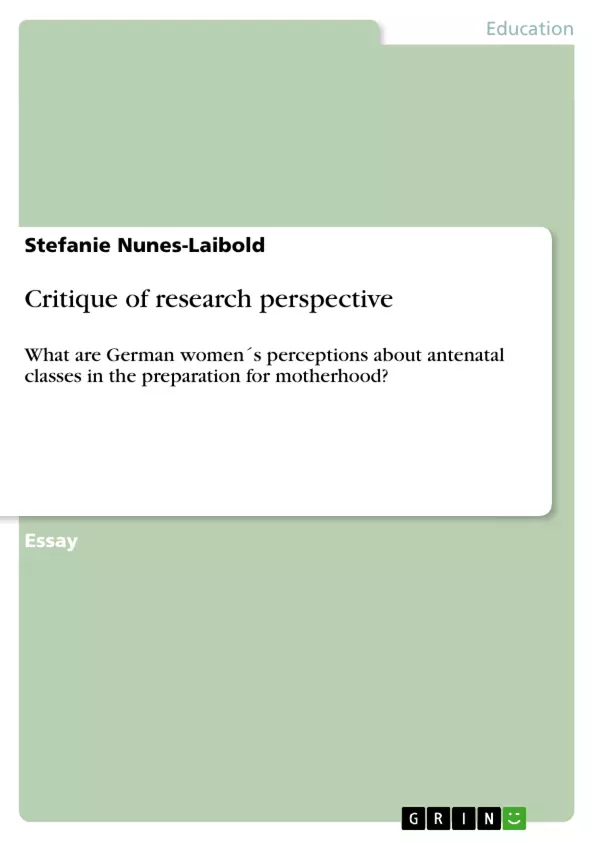Introduction:
Knowledge about childbirth and parenting has historically been gained informally from other women, mainly family members, and through practical experience of assisting with childbearing in extended families (Renkert & Nutbeam 2006). Nowadays the family structures have changed, the families are smaller and therefore midwives in Germany and worldwide offer antenatal classes during pregnancy in preparation for motherhood. With qualitative or quantitative research this topic can be explored to improve antenatal classes. The outlined information’s in this assignment about qualitative and quantitative research and the principles and critique of both perspectives will include strengths, limitations and assessment and relates to my final research proposal about antenatal classes.
Inhaltsverzeichnis (Table of Contents)
- Introduction
- Qualitative research question and critique of underlying perspective
- Quantitative research question and critique of underlying perspective
- Conclusion
- Reference list
Zielsetzung und Themenschwerpunkte (Objectives and Key Themes)
This assignment provides a critique of qualitative and quantitative research perspectives, focusing on the application of these approaches to understanding German women's perceptions about antenatal classes in preparing for motherhood. The goal is to analyze the strengths and limitations of both qualitative and quantitative research methods and to assess their suitability for this specific research question.
- Strengths and limitations of qualitative research methods.
- Strengths and limitations of quantitative research methods.
- Application of these methods to the specific research question.
- The suitability of each method for the research topic.
- The role of antenatal classes in preparing women for motherhood.
Zusammenfassung der Kapitel (Chapter Summaries)
The introduction provides background information on the historical context of antenatal classes and their role in modern-day childbirth preparation. It then lays out the purpose and scope of the assignment, outlining the focus on qualitative and quantitative research methods.
The section on qualitative research explores the definition, rationale, and strengths of this approach, highlighting its value for understanding complex social phenomena and providing insights into people's health-related behavior. The critique focuses on potential drawbacks related to sample size, subjective judgments, and the possibility of researcher bias. The author discusses how triangulation, which involves seeking evidence from multiple sources, can address these concerns.
The section on quantitative research delves into the transformation of qualitative findings into quantifiable data, emphasizing the importance of quantitative methods in the evidence-based paradigm and their role in medical research.
Schlüsselwörter (Keywords)
Key concepts explored in this assignment include antenatal classes, qualitative research, quantitative research, research perspectives, strengths and limitations, evidence-based practice, triangulation, and the role of midwives in supporting women's experiences of motherhood.
Frequently Asked Questions
What is the difference between qualitative and quantitative research?
Qualitative research focuses on understanding social phenomena and perceptions, while quantitative research transforms findings into measurable data to test hypotheses.
Why are antenatal classes important today?
Due to changing family structures and smaller extended families, formal classes by midwives have replaced informal knowledge transfer within families.
What are the limitations of qualitative research?
Potential limitations include small sample sizes, subjective interpretations, and the risk of researcher bias.
How can triangulation improve research quality?
Triangulation involves using multiple sources or methods to cross-verify evidence, thereby increasing the validity of the findings.
What is the role of midwives in research?
Midwives provide practical insights and are central to implementing evidence-based practices to improve motherhood preparation.
- Quote paper
- BSc of Midwifery Stefanie Nunes-Laibold (Author), 2007, Critique of research perspective, Munich, GRIN Verlag, https://www.grin.com/document/85908



